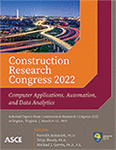Semantic Modeling for Supporting Planning Decision Making toward Smart Cities
Publication: Construction Research Congress 2022
ABSTRACT
The world is urbanizing rapidly. By 2050, 68% of the world population will reside in urban areas, posing unprecedented pressures on the livability, equity, and sustainability of city systems. While the concept of smart city holds great promise to release these pressures, the planning decision making toward smart cities is challenging because of the enormous breadth of smart city dimensions. As a result, decision makers are often lost in where and how to make the best investments to address the most pressing issues at hand. In recent years, many smart city initiatives and programs have been implemented, which offers an important source of smart city knowledge for decision makers to learn from. To this end, this paper proposes a smart city ontology, as a shared conceptualization of smart city knowledge, to facilitate the sharing and reuse of the knowledge for informed planning decision making. At the highest level of abstraction, the ontology semantically models three key elements of smart city knowledge, including visions, challenges, and solutions. This paper focuses on presenting the proposed ontology and its evaluation. The evaluation results showed the promise of the proposed ontology in supporting smart city planning decision making.
Get full access to this article
View all available purchase options and get full access to this chapter.
REFERENCES
Alawadhi, S., A. Aldama-Nalda, H. Chourabi, J. R. Gil-Garcia, S. Leung, S. Mellouli, T. Nam, T. A. Pardo, H. J. Scholl, and S. Walker. 2012. “Building understanding of smart city initiatives.” Lect. Notes Comput. Sci. 7443, 40–53. https://doi.org/10.1007/978-3-642-33489-4_4.
Albino, V., U. Berardi, and R. M. Dangelico. 2015. “Smart cities: Definitions, dimensions, performance, and initiatives.” J. Urban Technol. 22(1), 3–21.
Caragliu, A., C. Del Bo, and P. Nijkamp. 2011. “Smart cities in Europe.” J. Urban Technol. 18(2), 65–82.
City of Long Beach. 2019. “Smart City Initiative.” Accessed May 21, 2021. https://www.longbeach.gov/smartcity/.
El-Gohary, N. M., and T. E. El-Diraby. 2010. “Domain ontology for processes in infrastructure and construction.” J. Constr. Eng. Manage. 136(7), 730–744. https://doi.org/10.1061/(ASCE)CO.1943-7862.0000178.
Giffinger, R., C. Fertner, H. Kramar, R. Kalasek, N. P. Milanović, and E. Meijers. 2007. Smart Cities: Ranking of European medium-sized cities. Centre of Regional Science, Vienna University of Technology, Vienna.
Giffinger, R., and H. Gudrun. 2010. “Smart cities ranking: An effective instrument for the positioning of the cities?” ACE: Architecture, City and Environment. 12, 7–25.
Junior, B. A., M. A. Majid, and A. Romli. 2018. “Green information technology for sustainability elicitation in government-based organisations: an exploratory case study.” International Journal of Sustainable Society. 10(1), 20–41.
Lombardi, P., S. Giordano, H. Farouh, and W. Yousef. 2012. “Modelling the smart city performance.” Innovation: The European Journal of Social Science Research. 25(2), 137–149.
Mone, G. 2015. “The new smart cities.” Commun. ACM. 58(7), 20–21.
Mori, K., and A. Christodoulou. 2012. “Review of sustainability indices and indicators: Towards a new City Sustainability Index (CSI).” Environ. Impact Assess Rev. 32(1), 94–106. https://doi.org/10.1016/j.eiar.2011.06.001.
Shin, D. 2009. “Ubiquitous city: Urban technologies, urban infrastructure and urban informatics.” Journal of Information Science. 35(5), 515–526.
Smart Cities NYC. 2019. “Smart Cities New York.” Accessed May 13, 2021. https://smartcitiesny.com/.
Stolfi, F., and G. Sussman. 2001. “Telecommunications and transnationalism: 99 polarization of social space.” Information Society. 17(1), 49–62.
Tan, M. 1999. “Creating the digital economy: Strategies and perspectives from Singapore.” International Journal of Electronic Commerce. 3(3), 105–122.
UN (United Nations of Department of Economic and Social Affairs). 2019. 2018 Revision of World Urbanization Prospects. United Nations of Department of Economic and Social Affairs, New York.
USDOT (U. S. Department of Transportation). 2016. “Smart City Challenge.” Accessed May 29, 2021. https://www.transportation.gov/smartcity.
USDOT (U. S. Department of Transportation). 2015. Beyond traffic 2045: trends and choices. District of Columbia, Washington, US.
Winkowska, J., D. Szpilko, and S. Pejić. 2019. “Smart city concept in the light of the literature review.” Engineering Management in Production and Services. 11(2), 70–86. DOI: https://doi.org/10.2478/EMJ-2019-0012.
Winkowska, J., and D. Szpilko. 2020. “Methodology for Integration of Smart City Dimensions in the Socialised Process of Creating City Development.” European Research Studies Journal. XXIII(3), 524–547. DOI: https://doi.org/10.35808/ersj/1653.
Information & Authors
Information
Published In
History
Published online: Mar 7, 2022
Authors
Metrics & Citations
Metrics
Citations
Download citation
If you have the appropriate software installed, you can download article citation data to the citation manager of your choice. Simply select your manager software from the list below and click Download.
